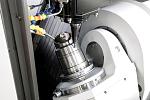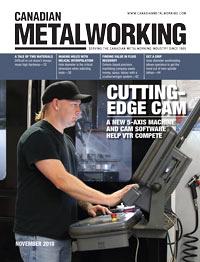- FMA
- The Fabricator
- FABTECH
- Canadian Metalworking
Finding value in fluid recovery
Ontario-based precision machining company saves money, space, labour with a crusher/wringer system
- By Canadian Metalworking
- November 29, 2018
- Article
- Metalworking
Situation
Anthony Screw Products Ltd., Burlington, Ont., is a precision machining company that produces numerous custom parts, including fittings, washers, nuts, bolts, and pulley hubs. With more than 25 years of experience working in every position in the plant’s manufacturing process, company President Rod Anthony has a unique and total understanding of the operation.
The privately owned, family-run business opened in 1978 with just two multispindle automatics in a 5,000-sq.-ft. workspace. Today the company operates in a facility that is more than four times the size of the original location and runs nearly 10 times as many multispindles in addition to CNC lathes, mills, and rotary transfer machines.
Prompted by a move to a new building as a result of this growth, Anthony took the opportunity to re-evaluate the company’s chip processing and fluid recovery system.
A small chip spinner had been used for 12 years. It stood vertically on a ball joint and springs, which needed to be replaced annually. Because of the spinner’s orientation, the equipment relied on gravity to recover oil from the chips and feed scrap bins. This process was not ideal for a number of reasons:
- Close to 50 per cent of the oil in the chips was not being recovered.
- The plant only was getting a 10 per cent return on reclaimed oil, at best.
- The chips were so heavily coated in oil that they were not bringing maximum value from the company’s scrap dealer.
- Gravity-feeding the bins required several extra dumpers, which took up valuable floor space.
- Dumping the chips daily into an outside bin was messy and expensive.
Because of the excessive maintenance, loss of value from materials, and general housekeeping issues, the latter being especially undesirable for a company that prides itself on maintaining a clean, efficient, and well-organized plant, Anthony didn’t even bother bringing the old spinner to the new facility. It did not have a shredder and it was not possible to add one to it either. In its place, he wanted a piece of equipment that could reduce the size of steel turnings, reclaim the excessive amount of residual cutting oil being lost, and discharge processed chips into a covered roll-off container.
Anthony did some investigating on chip spinners with other customers and went looking for a new machine. He decided that a complete automated chip processing system was needed.
Resolution
After partnering with PRAB on a new chip processing and fluid recovery system, Anthony said he has a new appreciation for the value of recycling.
“Costs were killing me before I received the new system,” Anthony said. “I knew recycling was important to the environment, but I never considered it from the standpoint of efficiency and cost savings. But now I realize it should be one of the first pieces of equipment you look at to solve problems in those areas. It just makes complete sense.”
PRAB’s system includes a high-level automatic cart dumper that feeds long, stringy turnings into a vertical-axis crusher to reduce them to flowable chips. Next, a steel-belt wringer feed conveyor collects the crushed chips and elevates them to a tramp metal separator for removal of accidentally ingested solids. Then, a diagonal shaft chip wringer separates oil from the chips with more than 600 Gs of centrifugal force before pneumatically discharging the dried chips into a covered roll-off container.
Finally, a settling tank captures reclaimed fluid and transfers it to a holding tank or a separate filtration system, while a recirculating drag conveyor returns fines to the chip flow to help keep the tank clean. The proposal also included options for loading a second container and filtering the reclaimed oil prior to transferring it to a tote, a bulk storage system that holds 1,100 litres of cutting oil.

Anthony Screw Products recently added a completely automated chip processing system to its shop floor to save space, time, and labour.
“In six weeks, I was buying 12 totes worth $27,000. Now, in the same six weeks, I buy one tote worth $2,250. That is a savings of 11 totes, or $24,750 in six weeks alone. Over $212,000 a year in oil savings. I am in shock along with everyone else in my plant.”
Extracting more oil from the chips is also paying off with his scrap dealer.
“On average, he is giving me an additional 15 per cent in value for dry chips instead of wet chips. That adds up to roughly $24,000 to $28,000 per year.”
Leaving money on the table because of ineffective chip processing and fluid recovery is now in the past for Anthony Screw Products. Wasted floor space because of the large number of totes, housekeeping issues caused by oil on the floor, and constant equipment maintenance have also been eliminated.
“Before the new system, I was gravity-draining the chips, and we had a lot of extra dumpers hanging around taking up space … at least a total of 70 dumpers instead of 30,” said Anthony. “Plus, we had to dump the chips daily into an open bin outside. The handling of the chips was costly and making a mess. With fewer bins sitting around, customers always comment about how clean our operation is.”
Anthony Screw Products, www.anthonyscrewproducts.com
PRAB, www.prab.com
About the Author
subscribe now


Keep up to date with the latest news, events, and technology for all things metal from our pair of monthly magazines written specifically for Canadian manufacturers!
Start Your Free Subscription- Trending Articles
Automating additive manufacturing

Sustainability Analyzer Tool helps users measure and reduce carbon footprint

GF Machining Solutions names managing director and head of market region North and Central Americas

Mitutoyo updates its end-user portal

Enhance surface finish with high-speed machining

- Industry Events
CTMA Economic Uncertainty: Helping You Navigate Kitchener Seminar
- May 2, 2024
- Kitchener, ON Canada
Automate 2024
- May 6 - 9, 2024
- Chicago, IL
ANCA Open House
- May 7 - 8, 2024
- Wixom, MI
17th annual Joint Open House
- May 8 - 9, 2024
- Oakville and Mississauga, ON Canada
MME Saskatoon
- May 28, 2024
- Saskatoon, SK Canada
















